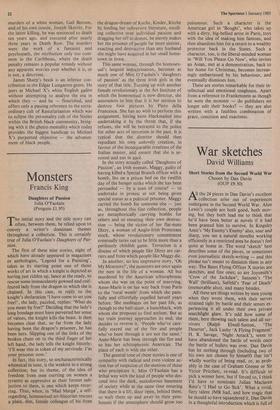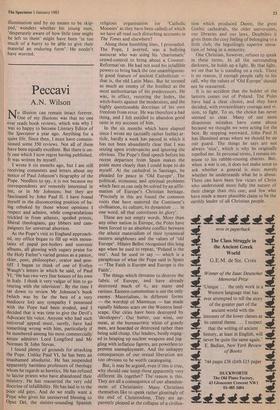War sketches
David Williams
Short Stories from the Second World War Chosen by Dan Davin (OUP £9.50)
Al the 24 pieces in Dan Davin's excellent collection arise out of experiences undergone in the Second World War. Alun Lewis's couple are both good, both mov- ing, but they both lead me to think that he'd have been better at novels if it had been granted him to survive. In Kingsley Amis's 'My Enemy's Enemy' also, sour and sharp, you see a natural novelist working efficiently in a restricted area he doesn't feel quite at home in. The word 'sketch' best describes some of the pieces, or sometimes even journalistic sketch-writing — and this phrase isn't meant to diminish them in any way. The Bates Flying Officer X stories are sketches, and fine ones; so are Joysmith's 'Crew of the Jackdaw', Sansom's 'The Wall' (brilliant), Salfeld's 'Fear of Death' (memorable also), and many besides.
All these are things written by men young when they wrote them, with their nerves strained tight by battle and their senses ex- periencing it all under their own private searchlight glare. It's odd how some of them, here showing such talent and all sur- vivors (Ralph Elwell-Sutton, 'The Deserter', Jack Lusby 'A Flying Fragment' H. R. Savage, 'Night Attack'), seem to have abandoned the battle of words once the battle of bullets was over. Dan Davin has let nothing through (including two of his own not chosen by himself) that isn't wholly worthy of being read, or, as prob- ably in the case of Graham Greene or Sir Victor Pritchett, re-read. It's difficult to pick a winner here, but if forced to, I think I'd have to nominate Julian Maclaren Ross's 'I Had to Go Sick'. What a vivid, fiery talent JMR had, and how tragic that he should so have squandered it. Dan Davin in a thoughtful introduction which is full of
illumination and by no means to be skip- ped, wonders whether his young men, `desperately aware of how little time might be left to them' might have been 'in too much of a hurry to be able to give their material an enduring form'. He needn't have worried.



































 Previous page
Previous page